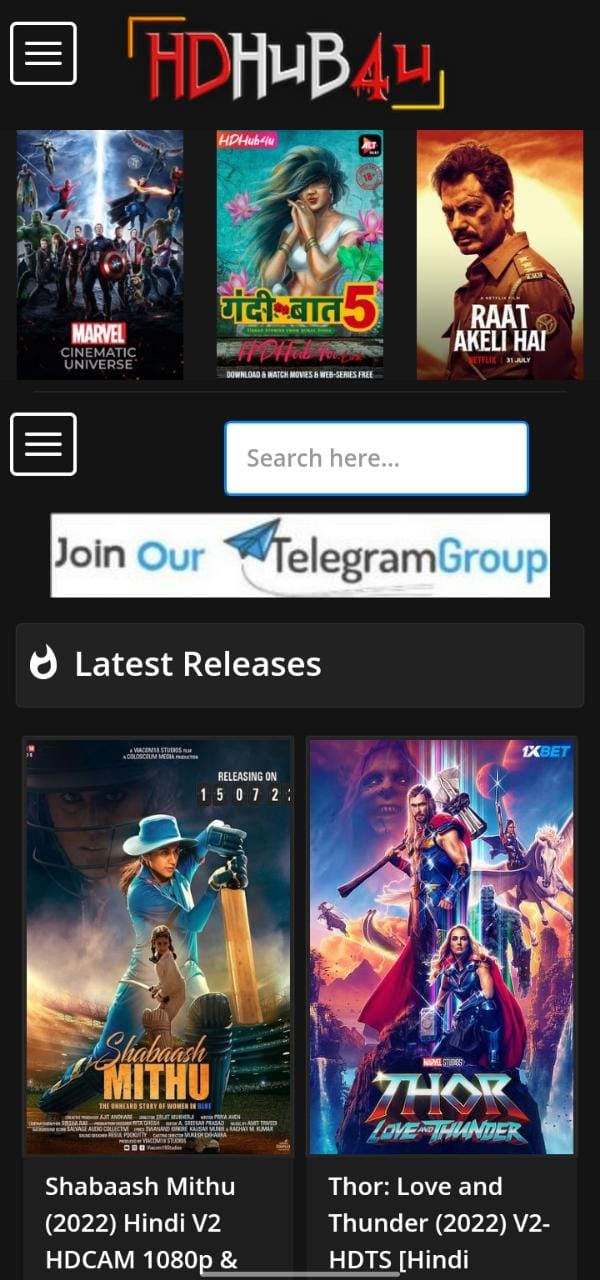Is the allure of free movie downloads too hard to resist? In an era where digital piracy thrives, platforms like HDHub4u promise access to Bollywood and Hollywood blockbusters without a second thought. However, this convenience comes at a significant cost. Copyright infringement not only undermines the creative industry but also exposes users to potential legal consequences and security risks. Despite these dangers, the demand for pirated content continues to grow, driven by the desire for instant gratification and cost savings.
HDHub4u has become synonymous with unauthorized movie downloads, offering everything from the latest Joker films to lesser-known indie titles. Users can find anything they desire, including Moonrise Anime and Novocaine, all available in high-definition quality. While it may seem like an attractive proposition, accessing such platforms raises ethical questions about supporting legitimate creators versus indulging in illegal activities. Moreover, the websites linked to HDHub4u often harbor malicious software that could compromise personal data. For instance, links leading to might appear legitimate but carry hidden threats.
| Name | Gael Breton |
|---|---|
| Date of Birth | March 15, 1987 |
| Place of Birth | Paris, France |
| Education | Bachelor's Degree in Computer Science |
| Career | Software Engineer & Cybersecurity Consultant |
| Professional Information | LinkedIn Profile |
Hyderabad’s Miyapur neighborhood offers a stark contrast to the online world of pirated movies. Here, residents have access to top television dealers who provide genuine products backed by warranties and customer support. These dealers specialize in both local and international brands, ensuring that buyers receive value for their money. Unlike downloading movies illegally, purchasing a new TV set ensures long-term satisfaction and peace of mind. Customers can choose from a wide range of models catering to different budgets and preferences, whether they are looking for basic LED screens or advanced smart TVs capable of streaming Netflix and Amazon Prime Video seamlessly.
The evolution of cinema is undeniable. From silent films to immersive experiences powered by cutting-edge technology, the art form has come a long way. Yet, despite advancements, piracy remains one of its most persistent challenges. Platforms like HDHub4u exploit consumer demand by providing unauthorized access to copyrighted material. This practice not only affects filmmakers financially but also discourages innovation within the industry. As Gael Breton noted on LinkedIn, while Google once served as the primary source of reliable information, it now doubles as a hub for entertainment seekers searching for quick fixes through dubious means.
In 2023, discussions around HDHub4u reached fever pitch levels among tech enthusiasts and legal experts alike. The platform emerged as a symbol of defiance against traditional distribution channels, challenging established norms regarding intellectual property rights. Its proxy sites list grew exponentially, allowing users worldwide unrestricted access to pirated content. Meanwhile, efforts to shut down these operations intensified, resulting in frequent domain changes and increased scrutiny from authorities.
Consider the case of Joker Folie A Deux, whose promotional posters generated immense buzz prior to release. Fans eagerly awaited its arrival, only to discover alternative ways of viewing it outside official channels. Such scenarios highlight the dual nature of modern fandom—celebrating creativity while simultaneously undermining it through unethical practices. Similarly, anime enthusiasts found themselves drawn towards sites offering episodes of Moonrise for free download, disregarding the labor-intensive process behind producing each frame.
For those seeking legitimate alternatives, several subscription-based services offer extensive libraries filled with legally acquired content. Services such as Disney+, Hulu, and Apple TV+ cater specifically to niche audiences, ensuring diverse representation across genres. They invest heavily in original programming, fostering relationships with talented directors, writers, and actors who contribute significantly to cultural discourse. By choosing these platforms over pirate networks, consumers actively participate in sustaining artistic expression rather than stifling it.
However, transitioning away from pirated sources requires effort and commitment. Many individuals justify their actions citing affordability issues or lack of availability in certain regions. Addressing these concerns necessitates collaboration between governments, production houses, and distributors to create inclusive ecosystems where everyone benefits equally. Initiatives aimed at reducing costs associated with streaming services combined with educational campaigns emphasizing the importance of respecting copyrights could pave the way forward.
Ultimately, the battle against piracy hinges upon changing societal attitudes towards consumption habits. Encouraging people to appreciate the value inherent in original works instead of settling for inferior copies will go a long way in preserving the integrity of global entertainment industries. It starts with making informed choices every time we press play or hit download. Will you join the movement toward responsible media usage?
As technology advances further into uncharted territories, so too does the complexity surrounding copyright laws increase proportionally. Balancing innovation with protection becomes paramount if future generations are to benefit fully from humanity's collective imagination manifested through film and television. Let us strive collectively towards creating sustainable solutions beneficial to all stakeholders involved—from creators striving tirelessly behind closed doors to audiences worldwide eagerly awaiting their next great escape.

